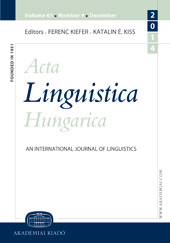The concept of preference and its manifestation in Hungarian verbal conflict sequences
The concept of preference and its manifestation in Hungarian verbal conflict sequences
Author(s): Ágnes LerchSubject(s): Pragmatics, Finno-Ugrian studies
Published by: Akadémiai Kiadó
Keywords: Hungarian; Hungarian; conversation analysis; preference; pragmatic principles; conflict communication;
Summary/Abstract: Preference is an operative notion of sequential organization and interpersonal understanding in conversation analysis. The complexity of the phenomenon that we are attempting to grasp through this notion has manifested itself in the seemingly controversial widening of the interpretation of the notion. In this paper I argue that preference can be interpreted through an inference rule as a consequence of the simultaneous but not equal manifestation of pragmatic principles; a deeper and uncontroversial interpretation of the notion is possible if, in addition to a structural inference rule and interpersonality principles, we take into consideration the role of rationality principles as well. In every communicative situation an interpersonal concern and a topical concern is operative; in consensus-oriented contexts preference structure is regulated by interpersonality principles that govern interpersonal relations and self-projection, while in conflict-oriented discourse the most important role is played by rationality principles. Approaching preference from the perspective of pragmatic principles may prove instrumental in integrating conversion analysis more closely with new directions and results of pragmatic research.
Journal: Acta Linguistica Hungarica (Since 2017 Acta Linguistica Academica)
- Issue Year: 52/2005
- Issue No: 1
- Page Range: 41-75
- Page Count: 35
- Language: English

